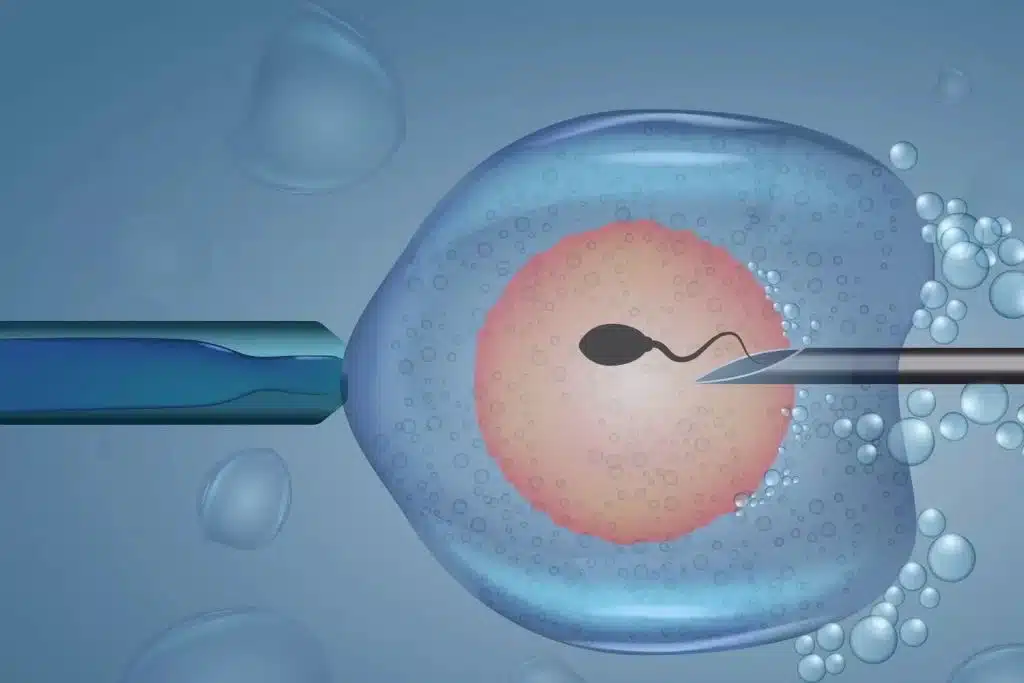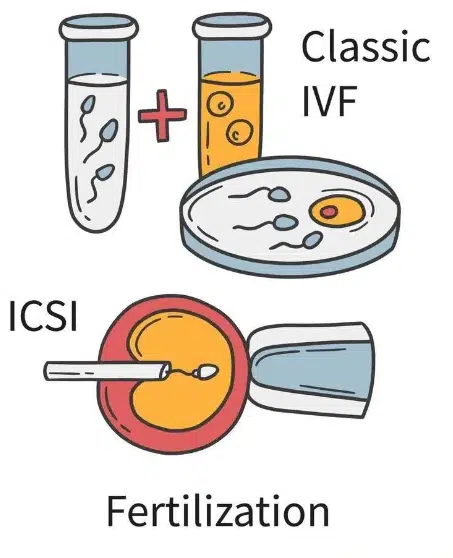What is Intracytoplasmic Sperm Injection (ICSI)?

Benefits of ICSI
Increased chances of fertilization: ICSI significantly enhances the success rate of fertilization, especially in cases of male infertility or when natural fertilization is problematic.
Use of a small number of sperm: This method can achieve successful fertilization even with a low sperm count or mobility issues.
Reduced risk of treatment failure: Intracytoplasmic sperm injection decreases the likelihood of failure in infertility treatment when other methods have been ineffective.
Intracytoplasmic Sperm Injection (ICSI) is an advanced assisted reproductive technique used to increase the chances of fertilization and pregnancy in cases of severe male infertility or fertilization issues. In this method, a sperm is directly injected into the cytoplasm of a mature egg to allow for a controlled fertilization process in a laboratory environment.
How is Intracytoplasmic Sperm Injection (ICSI) performed?
Diagnosis and investigation of infertility: Before starting ICSI, necessary tests and evaluations are conducted to determine the cause of infertility.
Collection of eggs and sperm: Eggs are collected from the woman's ovaries through a process called ovarian puncture. Sperm is also collected from the male and prepared. In cases where sperm count in the semen is very low or absent, sperm may be extracted through surgical methods such as testicular biopsy (TESE).
Preparation of sperm and eggs: Healthy and high-quality sperm are selected for injection. The eggs are also prepared for the injection process.
Injection of sperm into the egg: Using advanced microscopes and microinjection tools, a sperm is directly injected into the cytoplasm of the egg. This process is highly precise and conducted under controlled conditions.
Cultivation and growth of embryos: After sperm injection into the egg, the embryos are placed in special culture environments to initiate growth and cell division. The embryos grow for several days until they reach the appropriate stage for transfer to the uterus.
Transfer of embryos to the uterus: After a few days, healthy and high-quality embryos are transferred to the woman's uterus. This step is similar to the embryo transfer process in in vitro fertilization (IVF).
Indications for Intracytoplasmic Sperm Injection (ICSI)
Severe male infertility: When the sperm count is very low, the sperm have poor motility, or their shape is abnormal.
Failure of traditional IVF methods: In cases where standard IVF methods have not achieved fertilization, ICSI can increase the chances of fertilization.
Use of frozen sperm: In cases where frozen sperm is used, and the quality or motility of the sperm may be affected.
Structural or functional issues with sperm: In situations where sperm is unable to penetrate the egg due to structural or functional reasons.
Limited number of eggs: In cases where the number of available eggs for fertilization is limited, ICSI can help increase the chances of success.
ICSI treatment process
Differences Between IVF and ICSI

In vitro fertilization (IVF) and intracytoplasmic sperm injection (ICSI) are both advanced assisted reproductive technologies used to increase the chances of pregnancy for couples facing infertility issues. However, these two methods have key differences in how they are performed and when they are used.
In IVF, eggs and sperm are placed in a controlled laboratory environment to allow for natural fertilization. The sperm must actively penetrate the egg to fertilize it, meaning the fertilization occurs naturally without direct intervention.
IVF is suitable for women with infertility issues such as blocked or damaged fallopian tubes, ovulation disorders, or unexplained infertility. It is also appropriate when sperm quality is adequate, eliminating the need for direct injection of sperm into the egg.
In ICSI, a single sperm is injected directly into the cytoplasm of the egg. This method is used to ensure fertilization in cases where sperm cannot penetrate the egg naturally, or when there are low numbers or poor quality of sperm. ICSI is particularly beneficial for men with severe infertility issues, such as very low sperm count, poor sperm motility, or abnormal sperm shape. It is also utilized when there have been repeated failures in fertilization using IVF or when low-quality frozen sperm is used.
The success rate of IVF depends on the quality of the eggs and sperm as well as other factors, while ICSI tends to have higher success rates in cases of male infertility because the sperm is directly injected into the egg.
In terms of cost and complexity, ICSI is more expensive and complex due to the use of advanced technologies, whereas IVF is a simpler process.
Although both methods are safe, IVF may have complications such as ovarian stimulation and multiple pregnancies, while ICSI carries a slight risk of genetic issues.
